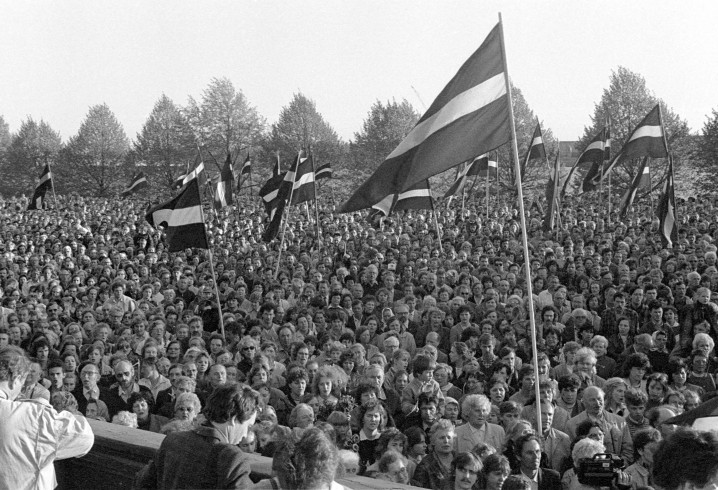The Reviled KGB Informers
"I am in shock. I had no idea. [The files must have been doctored and deliberately left as a] special gift [to Latvia], as part of a] disinformation operation [by retreating Soviet officers."
"It is impossible that the KGB would leave behind a real list of agents in what it considered enemy territory."
Rolands Tjarve, former director, Latvian post-independence national broadcaster
"He [Andres Slapine, Latvian cameraman shot and killed by Soviet troops with pro-independence activists in Riga, 1991] was a hero, not a traitor."
"How can he have been a KGB agent? It makes no sense."
Mara Sprudja, director, national archive
"Everything was in chaos in 1991. They could not organize a deep plot. they were too disorganized."
"The documents released so far present] only part of a very big puzzle [giving names but no details regarding the purported informants' role for their handlers. This reflects a] fake reality."
"As soon as someone is exposed publicly as an 'enemy', it is not easy for them to tell the truth."
Indulis Zalite, former longtime director, Latvian documentation centre
 |
| Latvian independence, 1991 |
Just as East Germans were shocked and appalled when former Stazi files neatly listing East German informers for the Communist East were published and names of those they portrayed, creating a fury of puzzled disbelief, so too is Latvia now undergoing a similar experience with recent revelations of betrayals under the Soviet yoke. Those whose names have been revealed are now passionately declaring their innocence; they never, ever acted as informants for the KGB; never were agents; the documents are false and utterly misleading.
As one of three Baltic nations now independent states since 1991, Latvia has spoken over the past 30 years with uncertainty over how to dispose of reams of documents left by the hasty retreat of the KGB. Bags of documents, files, briefcases full of secret files that the Cheka left behind. And while other former Soviet satellites such as Lithuania, Estonia and Georgia had their own KGB files to open and surprise themselves with, only Latvia had been left with a systematic index listing real and code names of over four thousand purported agents, inclusive of a digital archive of KGB activities.
Latvia's parliament took a vote and agreed the contents of the bags and the sacks stuffed with those secret files be posted online. Leaving it puzzled by the outcome; were so many among its citizens eager to aid the Soviet oppressors as collaborators and informers, or does this all represent a sinister, devious plot to sow disarray among the country's authorities disclosing fabricated records of betrayal at every level of society? Have they been the victim of Soviet secret police padding a list of informants to impress their superiors? Or was this a deliberate plant to shock Latvians in betrayal for the Soviets?
Some Latvians have now been identified as having been "in the bags", their ties to the files including a two-time former prime minister, the chief justice of the Supreme Court, a one-time foreign minister, leaders of the Catholic and Orthodox churches, three post-independence rectors of the University of Latvia, celebrated film-makers, and a number of Latvian television stars and writers. Releasing the names of people who succumbed to a terrible choice "in a different time and a different place has just created more confusion" not clarity, said Mara Sprudja, director of the national archive.
Lidija Lasmane, 93, a veteran of Latvia's Soviet era, wanted the documents released. She insisted historical truth must be known and an attempt made to answer a fundamental moral question: "How does a perfectly normal person become a beast ready to betray their friends, their family and their country?" Ah well, difficult times where the Soviet system placed people under dreadful pressure: "But every individual has a choice in the end. I knew from childhood that there is God and also the Devil. For me, there was never a real choice about what to do", she said.
 |
| Former GB Headquarters, the Corner House, in Riga, Latvia Akos Stiller Photos/The New York Times |

<< Home